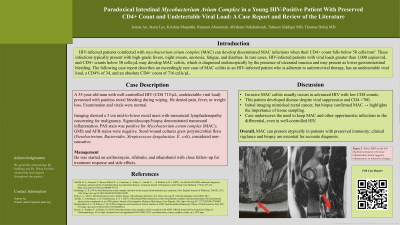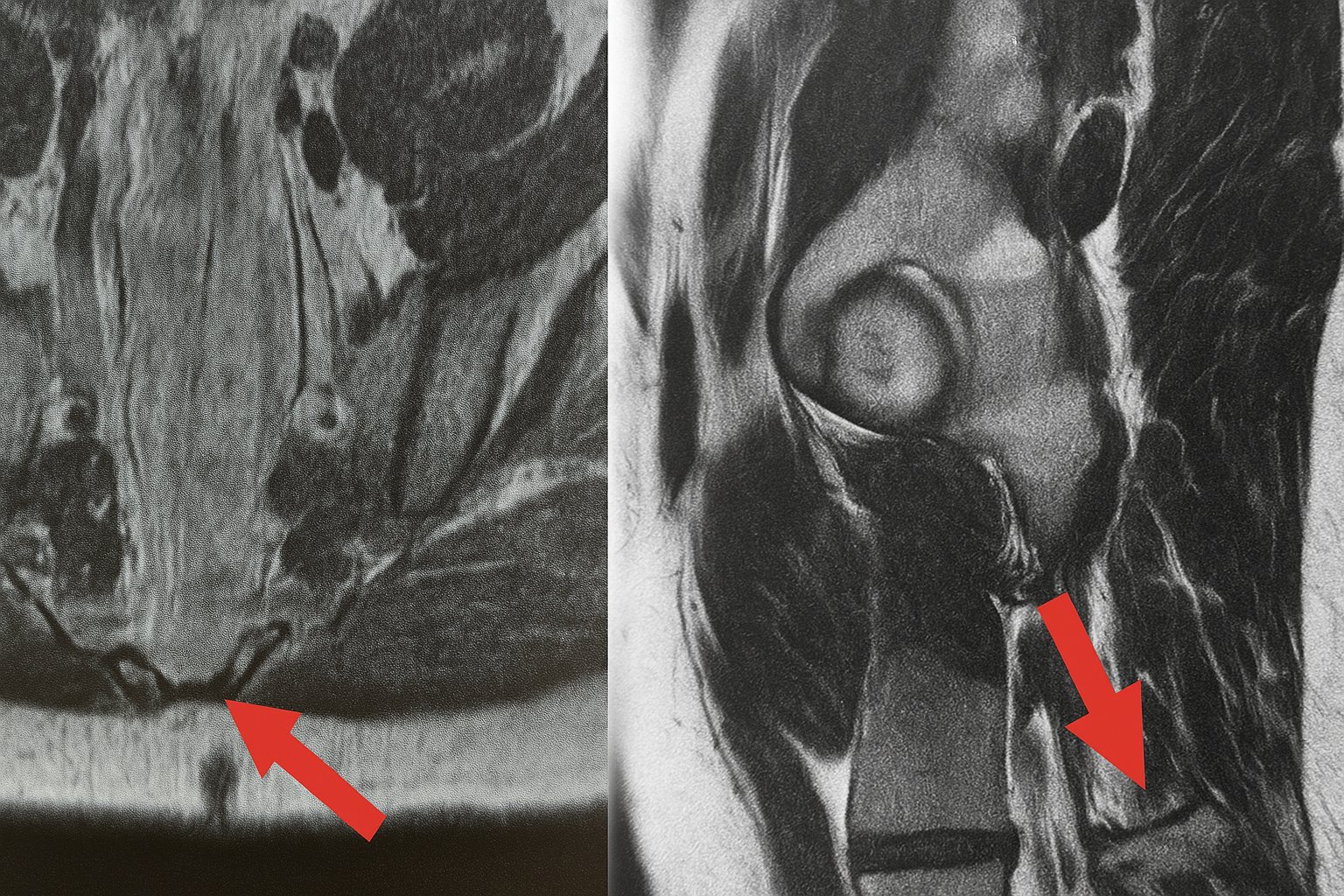Sunday Poster Session
Category: Colon
P0398 - Paradoxical Intestinal Mycobacterium Avium Complex in a Young HIV-Positive Patient With Preserved CD4+ Count and Undetectable Viral Load: A Case Report
Sunday, October 26, 2025
3:30 PM - 7:00 PM PDT
Location: Exhibit Hall

Has Audio

Jennie An, BS
St. James School of Medicine
Chicago, IL
Presenting Author(s)
Jennie An, BS1, Jason Lee, MS, MS, BA2, Krishna C. Moparthi, BA3, Raneem Abuamrah, MD4, Abraham Nakshabendi, BS5, Thomas Dekoj, MD6, Tahseen Saddiqui, MD7
1St. James School of Medicine, Chicago, IL; 2St. George's University School of Medicine, Chicago, IL; 3John F. Kennedy University School of Medicine, Newtown, PA; 4Balqa’ Applied University, Chicago, IL; 5St. James School of Medicine, Tampa, FL; 6Mount Sinai Hospital, Chicago, IL; 7Chicago Infectious Disease Physicians, Chicago, IL
Introduction: HIV-infected patients coinfected with mycobacterium avium complex (MAC) can develop disseminated MAC infections when their CD4+ count falls below 50 cells/mm³. These infections typically present with high-grade fevers, night sweats, anorexia, fatigue, and diarrhea. In rare cases, HIV-infected patients with viral loads greater than 1,000 copies/mL and CD4+ counts below 50 cells/μL may develop MAC colitis, which is diagnosed endoscopically by the presence of ulcerated mucosa and may present as lower gastrointestinal bleeding. The following case report describes an exceedingly rare case of MAC colitis in an HIV-infected patient who is adherent to antiretroviral therapy, has an undetectable viral load, a CD4% of 34, and an absolute CD4+ count of 716 cells/μL.
Case Description/Methods: A 35-year-old man with a five-year history of well-controlled HIV presented with painless rectal bleeding, primarily during wiping. He did not have pain, fever, or weight loss. Physical exam was unremarkable and vitals were normal. Law values showed CD4+ count of 715 cells/μL (34%), undetectable viral load, without evidence of organ dysfunction. Rapid plasma reagin was reactive at 1:11, yet did not play a role in the patient's symptomatology. Imaging revealed a 5 cm mid-to-lower rectal mass with mesorectal lymphadenopathy, which was concerning for malignancy. Sigmoidoscopy and biopsy revealed transmural inflammation. Periodic acid–Schiff stain was positive for MAC, yet Gomori methenamine silver stain and Acid-fast bacilli stains were negative. Fusobacterium, Bacteroides, Streptococcus dysgalactiae, and E. coli were revealed with stool and wound culture. However, this polymicrobial flora were not causative of symptoms. The patient was prescribed azithromycin, rifabutin, and ethambutol. Close follow-up during the duration of his treatment was planned to monitor for side effects and response to treatment.
Discussion: This case describes a 35-year-old HIV-positive patient with an undetectable viral load and a preserved CD4+ count of 716 cells/μL who developed invasive MAC colitis, a condition typically seen in advanced immunosuppression. Imaging initially suggested rectal cancer, but biopsy confirmed MAC infection, highlighting the diagnostic value of tissue sampling. This atypical presentation challenges the assumption that MAC occurs only in severely immunocompromised patients and emphasizes the importance of maintaining a broad differential and clinical vigilance in HIV-positive individuals with systemic illness.

Disclosures:
Jennie An, BS1, Jason Lee, MS, MS, BA2, Krishna C. Moparthi, BA3, Raneem Abuamrah, MD4, Abraham Nakshabendi, BS5, Thomas Dekoj, MD6, Tahseen Saddiqui, MD7. P0398 - Paradoxical Intestinal <i>Mycobacterium Avium</i> Complex in a Young HIV-Positive Patient With Preserved CD4+ Count and Undetectable Viral Load: A Case Report, ACG 2025 Annual Scientific Meeting Abstracts. Phoenix, AZ: American College of Gastroenterology.
1St. James School of Medicine, Chicago, IL; 2St. George's University School of Medicine, Chicago, IL; 3John F. Kennedy University School of Medicine, Newtown, PA; 4Balqa’ Applied University, Chicago, IL; 5St. James School of Medicine, Tampa, FL; 6Mount Sinai Hospital, Chicago, IL; 7Chicago Infectious Disease Physicians, Chicago, IL
Introduction: HIV-infected patients coinfected with mycobacterium avium complex (MAC) can develop disseminated MAC infections when their CD4+ count falls below 50 cells/mm³. These infections typically present with high-grade fevers, night sweats, anorexia, fatigue, and diarrhea. In rare cases, HIV-infected patients with viral loads greater than 1,000 copies/mL and CD4+ counts below 50 cells/μL may develop MAC colitis, which is diagnosed endoscopically by the presence of ulcerated mucosa and may present as lower gastrointestinal bleeding. The following case report describes an exceedingly rare case of MAC colitis in an HIV-infected patient who is adherent to antiretroviral therapy, has an undetectable viral load, a CD4% of 34, and an absolute CD4+ count of 716 cells/μL.
Case Description/Methods: A 35-year-old man with a five-year history of well-controlled HIV presented with painless rectal bleeding, primarily during wiping. He did not have pain, fever, or weight loss. Physical exam was unremarkable and vitals were normal. Law values showed CD4+ count of 715 cells/μL (34%), undetectable viral load, without evidence of organ dysfunction. Rapid plasma reagin was reactive at 1:11, yet did not play a role in the patient's symptomatology. Imaging revealed a 5 cm mid-to-lower rectal mass with mesorectal lymphadenopathy, which was concerning for malignancy. Sigmoidoscopy and biopsy revealed transmural inflammation. Periodic acid–Schiff stain was positive for MAC, yet Gomori methenamine silver stain and Acid-fast bacilli stains were negative. Fusobacterium, Bacteroides, Streptococcus dysgalactiae, and E. coli were revealed with stool and wound culture. However, this polymicrobial flora were not causative of symptoms. The patient was prescribed azithromycin, rifabutin, and ethambutol. Close follow-up during the duration of his treatment was planned to monitor for side effects and response to treatment.
Discussion: This case describes a 35-year-old HIV-positive patient with an undetectable viral load and a preserved CD4+ count of 716 cells/μL who developed invasive MAC colitis, a condition typically seen in advanced immunosuppression. Imaging initially suggested rectal cancer, but biopsy confirmed MAC infection, highlighting the diagnostic value of tissue sampling. This atypical presentation challenges the assumption that MAC occurs only in severely immunocompromised patients and emphasizes the importance of maintaining a broad differential and clinical vigilance in HIV-positive individuals with systemic illness.

Figure: Pelvic MRI on the left illustrates presacral soft tissue inflammation which suggests inflammatory and infectious changes.
Disclosures:
Jennie An indicated no relevant financial relationships.
Jason Lee indicated no relevant financial relationships.
Krishna Moparthi indicated no relevant financial relationships.
Raneem Abuamrah indicated no relevant financial relationships.
Abraham Nakshabendi indicated no relevant financial relationships.
Thomas Dekoj indicated no relevant financial relationships.
Tahseen Saddiqui indicated no relevant financial relationships.
Jennie An, BS1, Jason Lee, MS, MS, BA2, Krishna C. Moparthi, BA3, Raneem Abuamrah, MD4, Abraham Nakshabendi, BS5, Thomas Dekoj, MD6, Tahseen Saddiqui, MD7. P0398 - Paradoxical Intestinal <i>Mycobacterium Avium</i> Complex in a Young HIV-Positive Patient With Preserved CD4+ Count and Undetectable Viral Load: A Case Report, ACG 2025 Annual Scientific Meeting Abstracts. Phoenix, AZ: American College of Gastroenterology.
